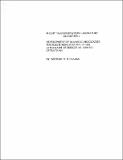| dc.contributor.author | Clarke, Michael D. D. | en_US |
| dc.contributor.other | Massachusetts Institute of Technology. Flight Transportation Laboratory | en_US |
| dc.date.accessioned | 2012-01-06T22:45:09Z | |
| dc.date.available | 2012-01-06T22:45:09Z | |
| dc.date.issued | 1998 | en_US |
| dc.identifier | 663475434 | en_US |
| dc.identifier.uri | http://hdl.handle.net/1721.1/68144 | |
| dc.description | Includes bibliographical references (p. [151]-158) | en_US |
| dc.description.abstract | Airlines are constantly faced with operational problems which develop from severe weather patterns and unexpected aircraft or personnel failures. However, very little research has been done on the problem of addressing the impact of irregular operations, and developing potential decision systems which could aid in aircraft re-scheduling. The primary goal of this research project has been to develop and validate algorithms, procedures and new methodologies to be used to reschedule planned activities (flights) in the event of irregular operations in large scale scheduled transportation systems, such as airline networks. A mathematical formulation of the Airline Schedule Recovery Problem is given, along with a decision framework which is used to develop efficient solution methodologies. These heuristic procedures and algorithms have been developed for potential use in a comprehensive real-time decision support systems (DSS), incorporating several aspects of the tactical operations of the transport system. These include yield management, vehicle routing, maintenance scheduling, and crew scheduling. The heuristic procedures developed will enable the carrier to recover from an irregular operation and maintain an efficient schedule for the remainder of a given resolution horizon. The algorithms are validated using real-world operational data from a major US domestic carrier, and data from an international carrier based in the Asia Pacific region. A comprehensive case study was conducted on historical operational data to compare the output of the algorithms to what actually occurred at the airline operation control center in the aftermath of an irregularity. Some of the issues considered include the percentage of flights delayed, percentage of flights cancelled, and the overall loss in operating revenue. From these analyses, it was possible to assess the potential benefits of such algorithms on the operations of an airline. | en_US |
| dc.format.extent | 161, [26] p | en_US |
| dc.publisher | [Cambridge, Mass. : Massachusetts Institute of Technology], Flight Transportation Laboratory, [1998] | en_US |
| dc.relation.ispartofseries | FTL report (Massachusetts Institute of Technology. Flight Transportation Laboratory) ; R98-1 | en_US |
| dc.subject | Airlines | en_US |
| dc.subject | Airports | en_US |
| dc.subject | Management | en_US |
| dc.subject | Traffic control | en_US |
| dc.title | Development of heuristic procedures for flight rescheduling in the aftermath of irregular airline operations | en_US |
| dc.type | Technical Report | en_US |
